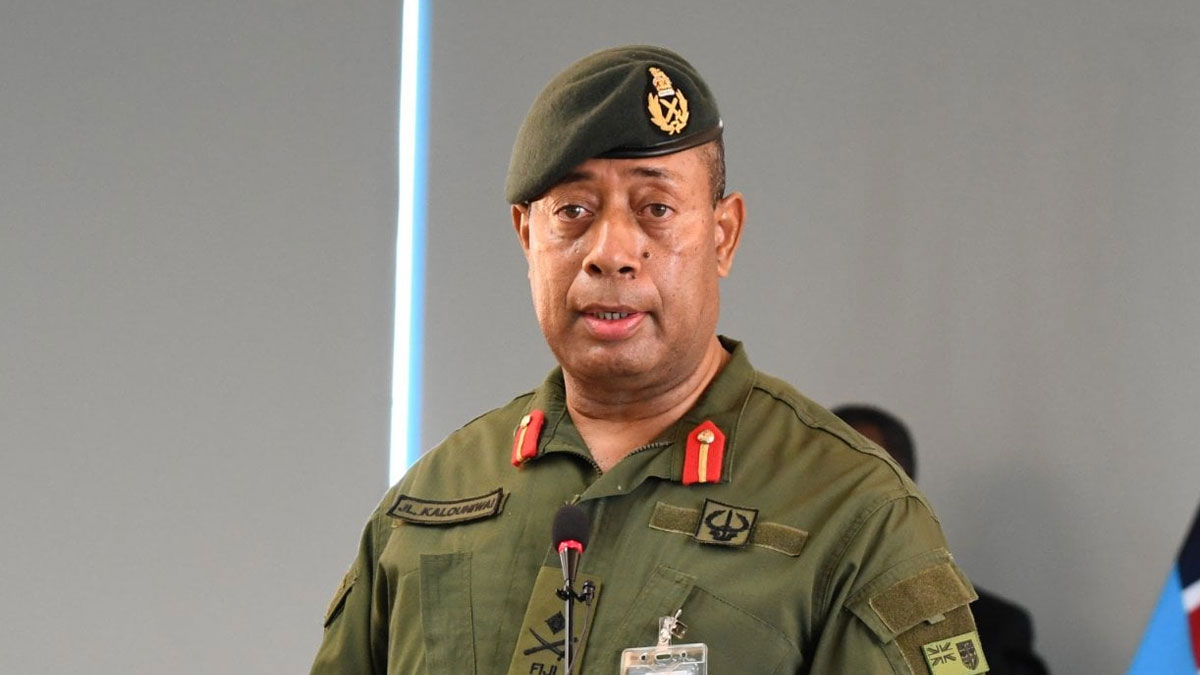The Commander of the Republic of Military Forces, Major General Ro Jone Kalouniwai says the RFMF is deeply concerned with the non-consultative approach taken by the Government of Fiji in its recent decision to disapprove the United Nations resolution on Gaza.
In a statement, Major General Kalouniwai said it is disheartening to see a decision taken without due consideration for the potential impact on the safety and well-being of our brave men and women in uniform.
He said this decision has significant implications for the safety and security of the RFMF troops currently deployed in the Middle East.
The Commander said the RFMF acknowledges the government’s prerogative to make decisions regarding international affairs; however, consultation with relevant stakeholders, including the RFMF, was essential in determining positions on critical matters such as the UN resolution on Gaza.
Major General Kalouniwai sid the decision to disapprove the resolution without prior consultation has raised concerns about the potential risk and danger faced by Fijian soldiers serving in the region.
He said the RFMF has a proud history of contributing to international peacekeeping efforts, including deployments to the Middle East.
The Commander said the Fijian troops have consistently displayed professionalism, dedication, and a commitment to upholding the values of peace and security.
Major General Kalouniwai urged the government to recognise the importance of inclusive decision-making processes, particularly when matters have significant implications for military personnel.
He said consultation with the RFMF and other relevant stakeholders was crucial to ensure a comprehensive understanding of the potential risks and to develop a well-informed position that aligns with Fiji’s commitment to peacekeeping efforts and the protection of troops serving in international peacekeeping duties.
He further urged the Government of Fiji to reevaluate its decision regarding the UN resolution on Gaza and consider the potential consequences for troops deployed in the Middle East.
Major General Kalouniwai said their safety and security should remain a top priority, and it is crucial that their contributions to international peacekeeping efforts are fully supported and respected.
The RFMF Commander remains committed to working constructively with the government to address this issue and to ensure that the interests and well-being of Fijian soldiers are safeguarded.
He said the RFMF believes in the power of open dialogue, collaboration, and informed decision-making to achieve the best outcomes for Fiji and its military forces.
Meanwhile, Fiji’s Prime Minister Sitiveni Rabuka said the government stance on international matters is rooted in the fundamental principles of the United Nations.
“When we participate in global debates or consider resolutions, we prioritise the sovereignty of UN member states, as outlined in the UN conventions. Our approach hinges on whether the issues at hand affect the sovereignty of the states recognised as part of the UN”.
“For instance, in the recent resolution and amendment votes, Fiji supported the amendment put forth by Canada, acknowledging the origins of the issue without assigning blame. The original resolution lacked this acknowledgment, which is why Fiji couldn’t vote for it,” Rabuka said in a statement.
“Regarding specific resolutions, such as Resolution 425 and 426 establishing United Nations interim forces in Lebanon, our focus was on the sovereign states involved, namely Israel and Lebanon, and their internationally recognised border. The involvement of the PLO wasn’t the primary consideration; rather, it was about maintaining the internationally recognised boundaries and promoting peace in the region.”
“As for decision-making within the government, there are times when the Prime Minister must make unilateral decisions and stand by them. These decisions are made within the party framework, and members of Parliament are free to express reservations if they disagree with the Prime Minister’s stance. We value unity under the current leadership, including the three deputy prime ministers. Any reservations expressed by coalition partners are considered, and discussions are held within the party”.
“Regarding allegations that religious beliefs influence decision-making, it’s important to note that the safety of Fijian peacekeepers has always been a concern. Fijian troops have operated in challenging and often dangerous environments, even before recent developments”.
“The decision to volunteer Fijian troops for peacekeeping missions was made under the instruction of former Prime Minister Ratu Sir Kamisese Mara, and it was based on the understanding that threats would persist until peace is fully restored in the region”.
“Our commitment to peacekeeping remains unwavering, and we are resolute in our efforts to contribute to global stability,” said Rabuka in a statement.
SOURCE: FIJI VILLAGE/FIJI GOVT/PACNEWS














